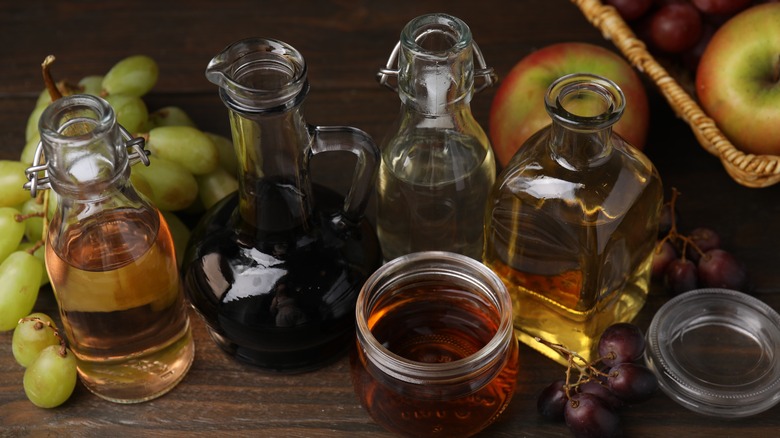The Sour Ingredient That Can Elevate A Simple Fried Egg
We may receive a commission on purchases made from links.
A necessary morning ritual and decidedly the most important meal of the day, a nourishing breakfast is essential. Despite being a potential source of morning joy and lasting energy, not everyone has the time to prepare a Michelin-star breakfast. But just because you're short on time, doesn't mean you can't put together an easy, flavor-forward morning meal. Take the humble fried egg for example, which is transformed with a dash of vinegar.
Eggs have a mild, buttery flavor that can benefit from added layers of depth. A few drops of vinegar infuse fried eggs with a tangy, acidic taste that complements those rich, fatty yolks like a culinary yin and yang. It's also a practical move that can help maintain the shape and prevent the egg whites from spreading across the surface of your pan. To use vinegar for shaping purposes, add a teaspoon to about half an inch of water in a skillet and bring to a boil. Fry your eggs in the boiling liquid to achieve perfectly shaped, zingy eggs. To incorporate vinegar solely as a flavoring agent, simply spoon a small amount over the fried eggs after plating them.
If you want to fry vinegar-tinted eggs like a pro, look to Michael Harlan Turkell's cookbook "Acid Trip: Travels in the World of Vinegar," which features Chef Bertrand Auboyneau's recipe. The French chef fries eggs in butter before removing them from the pan and reducing vinegar in the leftover butter to drizzle atop the fried eggs.
Vinegar variations for fried eggs
Although distilled white vinegar is the simplest way to zhuzh up a plain fried egg, there are other forms with different flavors to consider incorporating into this simple breakfast. Consider your options to determine which type best suits your morning mood.
Apple cider vinegar offers a fruit-forward, slightly sweet flavor profile accented by delicate whispers of autumnal apples. Red wine vinegar delivers a bold, fruity tang with a deep acidity that's assertive and bright. For something subtle that maintains a pleasant level of zest, rice vinegar is a mild-mannered option. Feeling extra adventurous? Balsamic vinegar brings an opulent, candied tang with complex notes of caramel and wood to a plain fried egg. Be careful not to add too much vinegar of any kind — the goal is to enhance the taste of fried eggs, not overpower them.
Don't trick yourself into thinking that fried eggs always taste better at a diner than they do at home. With a small amount of vinegar, you'll have restaurant-quality fried eggs with no extra elbow grease.

